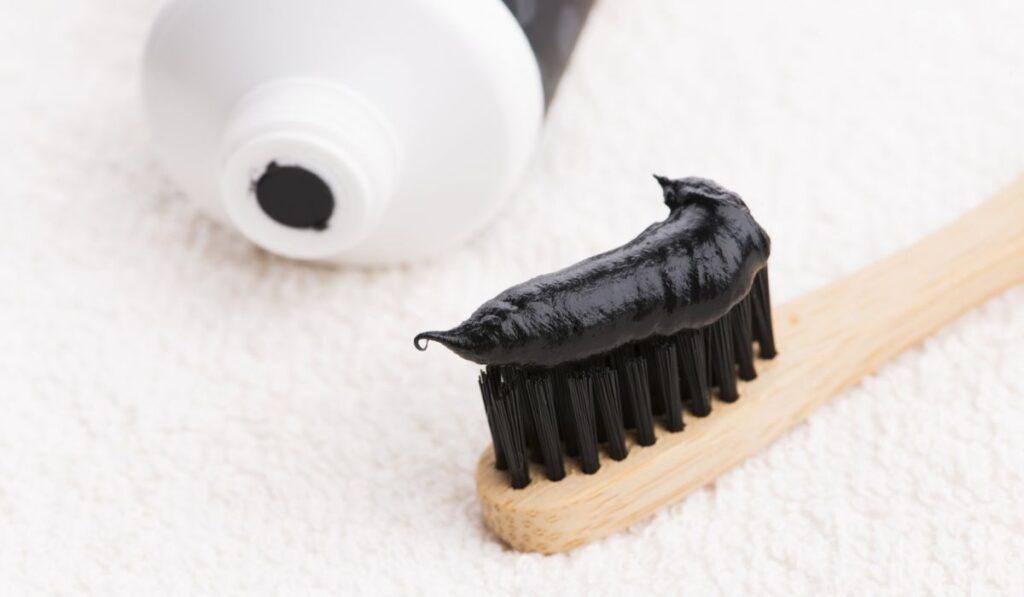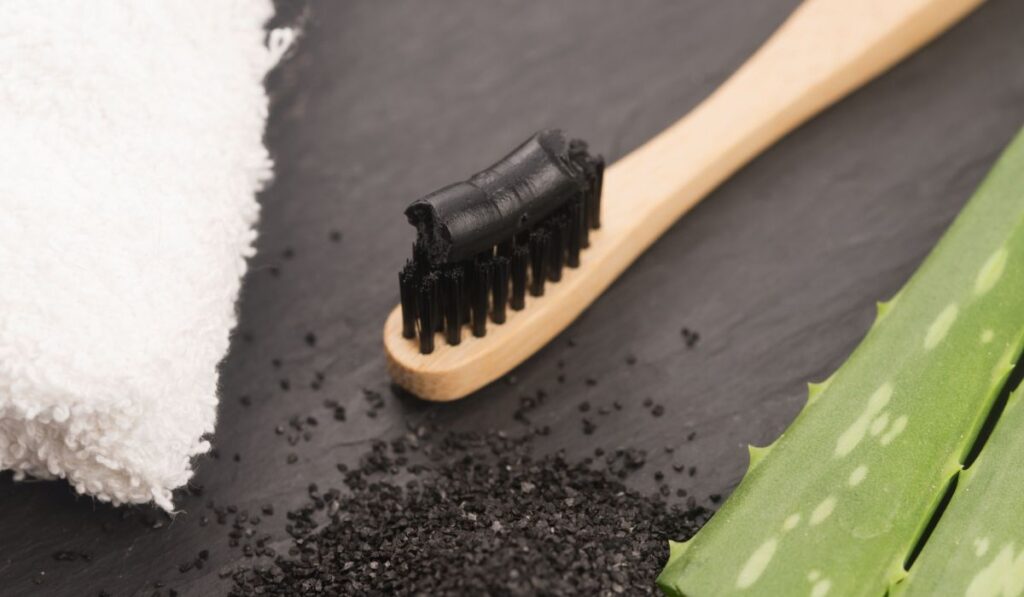Charcoal toothpaste has become quite trendy in dental care, with several celebrities and beauty bloggers promoting it on social media platforms. However, before you start riding the charcoal wave, it’s a good idea to learn more about charcoal toothpaste and what it can offer.
Charcoal toothpaste is antiviral and anti-fungal. Its abrasive properties may help whiten your teeth by eliminating surface stains. It can also remove plaque and improve bad breath. That said, it should be used sparingly, as the carbon particles can erode enamel.
Although charcoal toothpaste has many benefits to our dental health, it has some downsides too. Let’s look at those pros and cons and find out how often you should use charcoal toothpaste.
What Is Charcoal Toothpaste?

Charcoal toothpaste (on Amazon) is a unique toothpaste that contains activated charcoal, a fine grain powder fabricated from oxidizing natural compounds such as coconut shells and sawdust under extreme heat.
Heating the charcoal in the presence of gas alters its inner structure, making it more porous and better able to absorb and remove potentially toxic materials.
People have used activated charcoal for medicinal purposes since ancient times, and it was used for homemade toothpaste in the 19th century.
Toothpaste manufacturers claim that activated charcoal is abrasive and acts as a powerful magnet to bacteria, stains, and tartar. As a result, it can whiten teeth and combat bad breath.
How Does Charcoal Toothpaste Work?
Charcoal toothpaste works on the basis that the negatively charged, activated charcoal is able to attract positively charged particles towards it, such as plaque and stains. Studies have revealed that activated charcoal can adsorb accumulated plaque over the surface of teeth.
Charcoal toothpaste can indeed help eliminate surface stains from your teeth. Activated charcoal can attract compounds responsible for the extrinsic staining of teeth because of its adsorbing properties. However, there’s no evidence that it can help get rid of intrinsic stains.
Extrinsic stains are those found on the surface of teeth, just above the enamel layer. They’re caused by things like red wine, coffee, and tobacco. Intrinsic stains, on the other hand, are dark in color and visible below the enamel layer.
They are caused by trauma, weak enamel, and some medications. Some people may also find that their teeth are naturally darker in color.
Benefits of Charcoal Toothpaste
Charcoal toothpaste has numerous benefits to our dental health. Here are some of its advantages:
Eliminates Stains and Whitens Teeth
Thanks to its abrasive properties, charcoal removes extrinsic stains that gradually accumulate on the outermost surface of teeth. When you rinse the toothpaste out of your mouth, you wash out the stains, leaving your teeth looking whiter.
Removes Plaque and Freshens Breath
Activated charcoal attracts tiny food and plaque particles and also helps to raise the pH level of the oral cavity. This leads to the removal of acidic compounds from your mouth and eliminates bad mouth odor.
Unlikely to Affect Medications
Despite the rare reports, it’s highly unlikely that activated charcoal will affect medications.
Even though you can use activated charcoal to neutralize poisoning and drug overdose, it only affects medications when it comes in contact with them in the digestive tract over extended periods.
You have nothing to worry about if you’re on medication, as long as you carefully rinse out all the charcoal toothpaste to avoid swallowing some of its traces.
Downsides of Charcoal Toothpaste

Here are a couple of potential concerns to keep in mind before you discard your regular toothpaste in favor of a charcoal toothpaste:
It’s too abrasive for everyday use
The abrasive properties of charcoal toothpaste make it unsuitable for daily use as it can gradually wear down the enamel of your teeth, exposing underlying dentin and calcified yellow tissue. It can also make your teeth more sensitive.
It could cause new stains
The charcoal toothpaste can cause new stains on your teeth since the charcoal particles can get stuck and accumulate in the small cracks of teeth, leaving them with a grey-black appearance.
It doesn’t contain fluoride
Reports show that the recommended fluoride content is absent in many activated charcoal toothpaste brands. Prolonged use may weaken your enamel and pose greater risks to your dental health, such as decay and cavities.
It could stain dental restorations
Charcoal toothpaste can accumulate between crowns, bridges, white fillings, and veneers, resulting in grey-black outlines around those dental restorations.
Its long-term effects and safety are undetermined
There are serious safety concerns about using charcoal toothpaste. Additional research is still required to determine the safety and long-term effects of regularly using charcoal toothpaste and charcoal-based dentifrices.
It can’t detoxify the mouth
The manufacturers and marketers of charcoal toothpaste promote its sale by claiming that activated charcoal can detoxify your mouth, which is not accurate.
While it can attract plaque and food particles, thereby improving your breath, activated charcoal still doesn’t remove toxins from your body, simply because the gum and teeth have no detoxifying effect on the body, unlike the kidney.
Tips for Using Charcoal Toothpaste Correctly
If you still want to try out charcoal toothpaste, follow these tips for how to use it correctly and safely:
- Use charcoal toothpaste once in a while as a supplement to your regular fluoride toothpaste.
- Brush very gently while using it to lighten its abrasive effects, and rinse your mouth thoroughly afterward.
- If you have dental restorations, observe caution when using it to prevent the potential risk of charcoal accumulating around them and causing awful stains.


